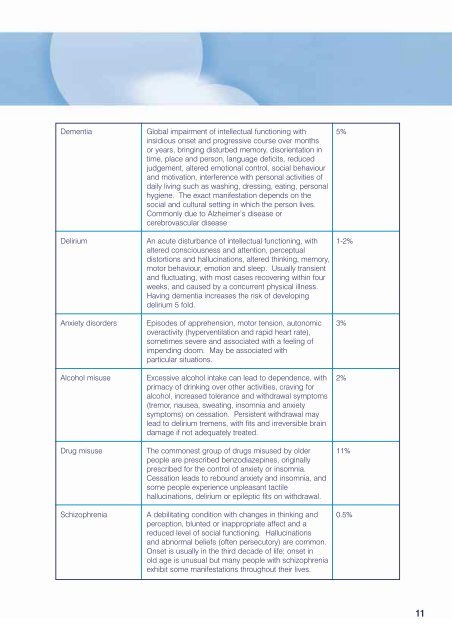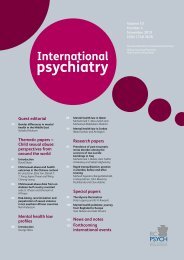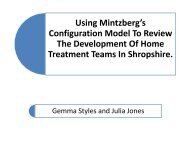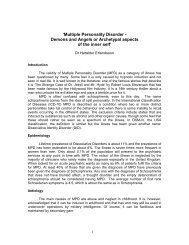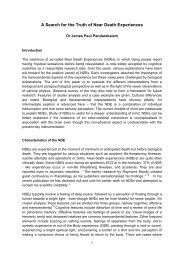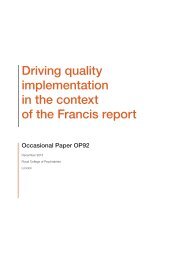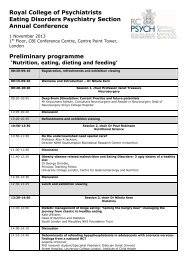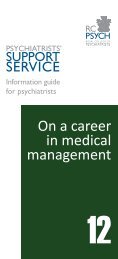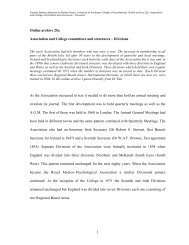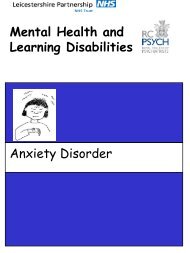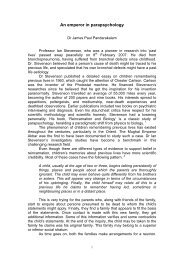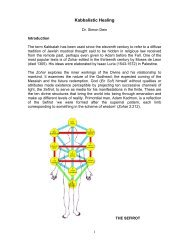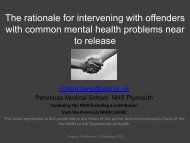Who Cares Wins - Royal College of Psychiatrists
Who Cares Wins - Royal College of Psychiatrists
Who Cares Wins - Royal College of Psychiatrists
Create successful ePaper yourself
Turn your PDF publications into a flip-book with our unique Google optimized e-Paper software.
Dementia Global impairment <strong>of</strong> intellectual functioning with 5%<br />
insidious onset and progressive course over months<br />
or years, bringing disturbed memory, disorientation in<br />
time, place and person, language deficits, reduced<br />
judgement, altered emotional control, social behaviour<br />
and motivation, interference with personal activities <strong>of</strong><br />
daily living such as washing, dressing, eating, personal<br />
hygiene. The exact manifestation depends on the<br />
social and cultural setting in which the person lives.<br />
Commonly due to Alzheimer’s disease or<br />
cerebrovascular disease<br />
Delirium An acute disturbance <strong>of</strong> intellectual functioning, with 1-2%<br />
altered consciousness and attention, perceptual<br />
distortions and hallucinations, altered thinking, memory,<br />
motor behaviour, emotion and sleep. Usually transient<br />
and fluctuating, with most cases recovering within four<br />
weeks, and caused by a concurrent physical illness.<br />
Having dementia increases the risk <strong>of</strong> developing<br />
delirium 5 fold.<br />
Anxiety disorders Episodes <strong>of</strong> apprehension, motor tension, autonomic 3%<br />
overactivity (hyperventilation and rapid heart rate),<br />
sometimes severe and associated with a feeling <strong>of</strong><br />
impending doom. May be associated with<br />
particular situations.<br />
Alcohol misuse Excessive alcohol intake can lead to dependence, with 2%<br />
primacy <strong>of</strong> drinking over other activities, craving for<br />
alcohol, increased tolerance and withdrawal symptoms<br />
(tremor, nausea, sweating, insomnia and anxiety<br />
symptoms) on cessation. Persistent withdrawal may<br />
lead to delirium tremens, with fits and irreversible brain<br />
damage if not adequately treated.<br />
Drug misuse The commonest group <strong>of</strong> drugs misused by older 11%<br />
people are prescribed benzodiazepines, originally<br />
prescribed for the control <strong>of</strong> anxiety or insomnia.<br />
Cessation leads to rebound anxiety and insomnia, and<br />
some people experience unpleasant tactile<br />
hallucinations, delirium or epileptic fits on withdrawal.<br />
Schizophrenia A debilitating condition with changes in thinking and 0.5%<br />
perception, blunted or inappropriate affect and a<br />
reduced level <strong>of</strong> social functioning. Hallucinations<br />
and abnormal beliefs (<strong>of</strong>ten persecutory) are common.<br />
Onset is usually in the third decade <strong>of</strong> life; onset in<br />
old age is unusual but many people with schizophrenia<br />
exhibit some manifestations throughout their lives.<br />
11


